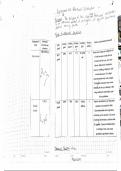Fractional distillation - Study guides, Class notes & Summaries
Looking for the best study guides, study notes and summaries about Fractional distillation? On this page you'll find 220 study documents about Fractional distillation.
Page 4 out of 220 results
Sort by
This is the entire section of the fifth lab for CLAB 267, including the purpose, table of chemical properties, procedure, chemical reactions, data/calculations, and the discussion of results.
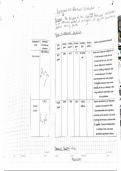
-
Lab 5 Fractional Distillation
- Class notes • 4 pages • 2023
- Available in package deal
-
- $8.49
- + learn more
This is the entire section of the fifth lab for CLAB 267, including the purpose, table of chemical properties, procedure, chemical reactions, data/calculations, and the discussion of results.
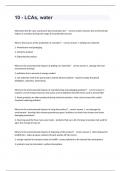
-
10 - LCAs, water with complete solutions
- Exam (elaborations) • 6 pages • 2024
- Available in package deal
-
- $12.99
- + learn more
10 - LCAs, water with complete solutions What does the life cycle assessment (LCA) of product do? - correct answer Assesses the environmental impact of a product during each stage of its production process What is the process of the production of a product? - correct answer 1. Getting raw materials 2. Manufacture and packaging 3. Using the product 4. Disposing the product What are the environmental impacts of getting raw materials? - correct answer 1. damage the local environment (mi...
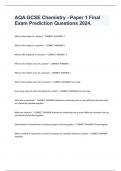
-
AQA GCSE Chemistry - Paper 1 Questions And Answers 2024.
- Exam (elaborations) • 26 pages • 2024
-
Available in package deal
-
- $12.49
- + learn more
AQA GCSE Chemistry - Paper 1 Questions And Answers 2024. What is the charge of a proton? - CORRECT ANSWER +1 What is the charge of a neutron? - CORRECT ANSWER 0 What is the charge of an electron? - CORRECT ANSWER -1 What is the relative mass of a proton? - CORRECT ANSWER 1 What is the relative mass of a neutron? - CORRECT ANSWER 1 What is the relative mass of an electron? - CORRECT ANSWER Very small How many types of atoms do elements contain? - CORRECT ANSWER Only one type ...
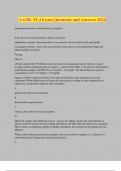
-
AAMC FL4 Exam Questions and Answers 2024
- Exam (elaborations) • 14 pages • 2024
- Available in package deal
-
- $12.49
- + learn more
AAMC FL4 Exam Questions and Answers 2024 spontaneous reaction -Answer-delta g is negative if the reaction is not spontaneous, delta g is positive. equilibrium constant -Answer-products over reactants; do not include solids and liquids According to Table 1, what is the concentration of the glucose in the blood from which the diluted sample was taken? Passage: table & a blood sample with 1/30 dilution ratio was mixed in a transparent cuvette with an oxygen- acceptor solution containing gl...
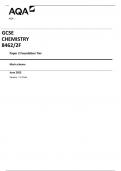
-
AQA GCSE CHEMISTRY 8462/2F Paper 2 Foundation Tier Mark scheme 2023
- Exam (elaborations) • 27 pages • 2024
-
Available in package deal
-
- $12.49
- + learn more
Mars 1 AO1 4.9.1.2 20% 1 AO1 and plants evolved photosynthesis took place 1 1 AO1 4.9.1.39.1.1 (y-axis labelled) 5, 10, 15, (20) oxygen bar drawn to 16% allow (y-axis labelled) 4, 8, 12, 16, (20) ignore correct intermediate values allow a tolerance of ± 1⁄2 a small square 1 1 AO2 4.9.1.3 test tube A 1 AO2 4.6.1.2 a glowing splint 1 AO1 4.8.2.2 manganese dioxide is a catalyst in this reaction 1 AO2 4.6.1.4 (the poly(propene) beaker will begin ...
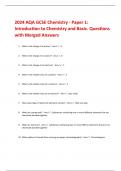
-
2024 AQA GCSE Chemistry - Paper 1: Introduction to Chemistry and Basic. Questions with Merged Answers
- Exam (elaborations) • 25 pages • 2024
- Available in package deal
-
- $11.49
- + learn more
1. What is the charge of a proton? - Ans .+1 2. What is the charge of a neutron? - Ans .0 3. What is the charge of an electron? - Ans .-1 4. What is the relative mass of a proton? - Ans .1 5. What is the relative mass of a neutron? - Ans .1 6. What is the relative mass of an electron? - Ans .Very small 7. How many types of atoms do elements contain? - Ans .Only one type 8. What are compounds? - Ans .Substances containing two or more different elements that are chemically bonded together...
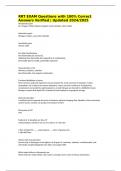
-
RRT EXAM Questions with 100% Correct Answers Verified | Updated 2024/2025
- Exam (elaborations) • 5 pages • 2024
-
- $9.59
- + learn more
RRT EXAM Questions with 100% Correct Answers Verified | Updated 2024/2025 therapeutic gases Air, Oxygen, Heliox (Helium/oxygen) Carbon Dioxide, Nitric Oxide Laboratory gases Nitrogen, helium, and carbon dioxide Anesthetic gases nitrous oxide Fire Risk Classifications Non-flammable (do not burn); Oxidizing (non-flammable but supportive of combustion); Flammable (burns readily, potentially explosive) Characteristics of o2 Odorless, tasteless, colorless Non-flammable, b...
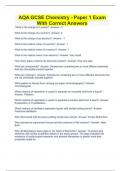
-
AQA GCSE Chemistry - Paper 1 Exam With Correct Answers
- Exam (elaborations) • 19 pages • 2023
-
- $11.19
- + learn more
What is the charge of a proton? -Answer +1 What is the charge of a neutron? -Answer 0 What is the charge of an electron? -Answer -1 What is the relative mass of a proton? -Answer 1 What is the relative mass of a neutron? -Answer 1 What is the relative mass of an electron? -Answer Very small How many types of atoms do elements contain? -Answer Only one type What are compounds? -Answer Substances containing two or more different elements that are chemically bonded toge...
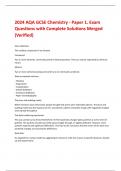
-
2024 AQA GCSE Chemistry - Paper 1. Exam Questions with Complete Solutions Merged (Verified)
- Exam (elaborations) • 26 pages • 2024
-
- $11.49
- + learn more
Atom definition The smallest component of an element Compound Two or more elements, chemically joined in fixed proportions. They can only be separated by chemical means. Mixture Two or more elements/compounds which are not chemically combined. Ways to separate mixtures - Filtration - Evaporation - Crystallisation - Simple distillation - Fractional distillation - Paper chromatography The plum and pudding model Before electrons were discovered, people thought that atoms were indivi...

How much did you already spend on Stuvia? Imagine there are plenty more of you out there paying for study notes, but this time YOU are the seller. Ka-ching! Discover all about earning on Stuvia

